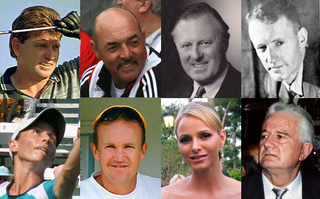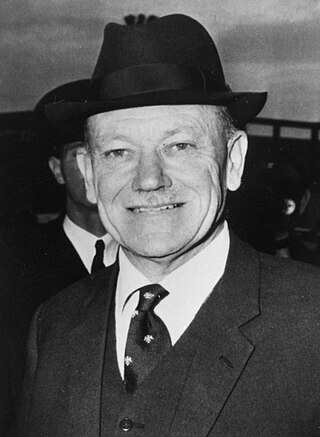Related Research Articles

Rhodesia, officially from 1970 the Republic of Rhodesia, was an unrecognised state in Southern Africa from 1965 to 1979. During this fourteen-year period, Rhodesia served as the de facto successor state to the British colony of Southern Rhodesia, and in 1980 it became modern day Zimbabwe.

Southern Rhodesia was a landlocked, self-governing British Crown colony in Southern Africa, established in 1923 and consisting of British South Africa Company (BSAC) territories lying south of the Zambezi River. The region was informally known as South Zambesia until annexation by Britain, at the behest of Cecil Rhodes's British South Africa Company. The bounding territories were Bechuanaland (Botswana), Northern Rhodesia (Zambia), Portuguese Mozambique (Mozambique) and the Transvaal Republic.

Rhodesia's Unilateral Declaration of Independence (UDI) was a statement adopted by the Cabinet of Rhodesia on 11 November 1965, announcing that Rhodesia a British territory in southern Africa that had governed itself since 1923, now regarded itself as an independent sovereign state. The culmination of a protracted dispute between the British and Rhodesian governments regarding the terms under which the latter could become fully independent, it was the first unilateral break from the United Kingdom by one of its colonies since the United States Declaration of Independence in 1776. The UK, the Commonwealth, and the United Nations all deemed Rhodesia's UDI illegal, and economic sanctions, the first in the UN's history, were imposed on the breakaway colony. With the help of the Commonwealth Secretariat, members of the Commonwealth were able to cooperate and advise Rhodesian Africans on policy. Amid near-complete international isolation, Rhodesia continued as an unrecognised state with the assistance of South Africa and Portugal.

Sir Roland "Roy" Welensky was a Northern Rhodesian politician and the second and last Prime Minister of the Federation of Rhodesia and Nyasaland.

Winston Joseph Field was a Rhodesian politician who served as the seventh Prime Minister of Southern Rhodesia. Field was a former Dominion Party MP who founded the Rhodesian Front political party with Ian Smith.

The Rhodesian Bush War, also known as the Second Chimurenga as well as the Zimbabwean War of Independence, was a civil conflict from July 1964 to December 1979 in the unrecognised country of Rhodesia.

Sir Edgar Cuthbert Fremantle Whitehead, was a Rhodesian politician and statesman who served as Prime Minister of Southern Rhodesia from 1958 to 1962. He had a long and varied political career, serving as a longstanding member of the Southern Rhodesian Legislative Assembly and in a variety of minister posts over the course of nearly three decades. simultaneously serving in a variety of government position posts. His work was frequently interrupted by recurring health problems; he suffered from poor eyesight and later experienced deafness whilst in office. An ally of Sir Roy Welensky, he was Prime Minister of Southern Rhodesia from 1958 to 1962. His government was defeated in the 1962 general election by the Rhodesian Front.

White Zimbabweans, also known as White Rhodesians or simply Rhodesians, are a Southern African people of European descent. In linguistic, cultural, and historical terms, these people of European ethnic origin are mostly English-speaking descendants of British settlers. A small minority are either Afrikaans-speaking descendants of Afrikaners from South Africa or those descended from Greek, Portuguese, Italian, and Jewish immigrants.
Gerald Bryan Sheil O'Cleary Clarke was a Rhodesian civil servant.
Sir John Baines Johnston was a British diplomat. He is best known for being Britain's High Commissioner to Rhodesia when that colony made its Unilateral Declaration of Independence in November 1965.

The Rhodesian Air Force (RhAF) was an air force based in Salisbury which represented several entities under various names between 1935 and 1980: originally serving the British self-governing colony of Southern Rhodesia, it was the air arm of the Federation of Rhodesia and Nyasaland between 1953 and 31 December 1963; of Southern Rhodesia once again from 1 January 1964; and of the unrecognised nation of Rhodesia following its Unilateral Declaration of Independence from Britain on 11 November 1965.
The Independence Decoration was a Rhodesian civil decoration awarded to persons who played a notable and significant part in the Unilateral Declaration of Independence in 1965.
Kenneth Flower, ID was a Rhodesian police officer and intelligence chief.

The Rhodesian mission in Lisbon, the capital of Portugal, operated from September 1965 to May 1975. It was a diplomatic mission representing Rhodesia, initially as a self-governing colony of Britain and, after the Unilateral Declaration of Independence in November 1965, as an unrecognised state. Rhodesia informed Britain of its intent to open a Lisbon mission headed by an accredited representative, independent from the British Embassy in the city, in June 1965. Whitehall refused to endorse the idea but Rhodesia continued nonetheless, and later that month appointed Harry Reedman to head the mission. The British government attempted unsuccessfully to block this unilateral act—Rhodesia's first—for some months afterwards.
William John Harper was a politician, general contractor and Royal Air Force fighter pilot who served as a Cabinet minister in Rhodesia from 1962 to 1968, and signed that country's Unilateral Declaration of Independence (UDI) from Britain in 1965. Born into a prominent Anglo-Indian merchant family in Calcutta, Harper was educated in India and England and joined the RAF in 1937. He served as an officer throughout the Second World War and saw action as one of "The Few" in the Battle of Britain, during which he was wounded in action. Appalled by Britain's granting of independence to India in 1947, he emigrated to Rhodesia on retiring from the Air Force two years later.

Sir Thomas Hugh William Beadle, was a Rhodesian lawyer, politician and judge who served as Chief Justice of Southern Rhodesia from March 1961 to November 1965, and as Chief Justice of Rhodesia from November 1965 until April 1977. He came to international prominence against the backdrop of Rhodesia's Unilateral Declaration of Independence (UDI) from Britain in November 1965, upon which he initially stood by the British Governor Sir Humphrey Gibbs as an adviser; he then provoked acrimony in British government circles by declaring Ian Smith's post-UDI administration legal in 1968.

Queen of Rhodesia was the title asserted for Elizabeth II as Rhodesia's constitutional head of state following the country's Unilateral Declaration of Independence from the United Kingdom. However, the position only existed under the Rhodesian constitution of 1965 and remained unrecognised elsewhere in the world. The British government, along with the United Nations and almost all governments, regarded the declaration of independence as an illegal act and nowhere else was the existence of the British monarch having separate status in Rhodesia accepted. With Rhodesia becoming a republic in 1970, the status or existence of the office ceased to be contestable.
John McVicar Malloch ICD, was a South African-born Rhodesian bush pilot, gun-runner and sanctions-buster who flew in World War II and in various legal and illegal roles around Africa and the Middle East until the early 1980s. In 1978, he was the final recipient of the Rhodesian civil Independence Commemorative Decoration for services rendered to the country.
Albert Rubidge Washington Stumbles, was a Southern Rhodesian lawyer and politician. After serving as a minister under Garfield Todd and Edgar Whitehead, Stumbles became the Speaker of the Legislative Assembly of Southern Rhodesia in 1964, a post he held until 1972. As Speaker, Stumbles is best remembered for his acceptance of Southern Rhodesia's Unilateral Declaration of Independence in 1965.
Julian MacDonald Greenfield, CMG was a South Rhodesian lawyer, politician, and judge who held office in Southern Rhodesia and within the Federation of Rhodesia and Nyasaland.
References
- http://www.rhodesia.nl/rhodesiana/volume40.pdf
- Elaine Windrich, Britain and the Politics of Rhodesian Independence (Croom Helm Ltd, 1978)